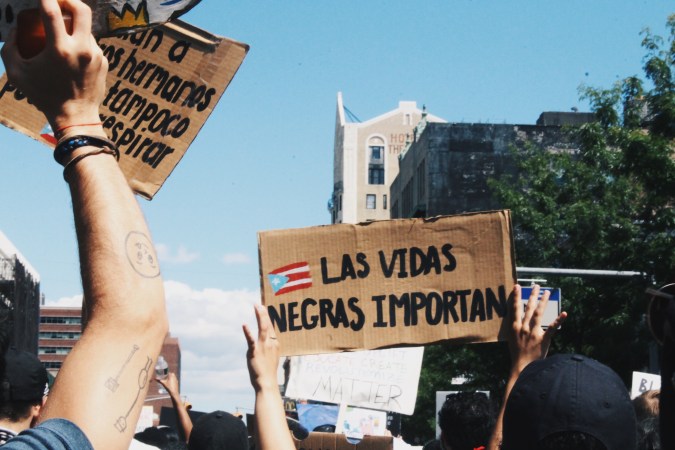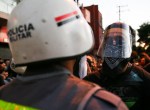On June 6, hundreds of people gathered at Mitchell Square Park in upper Manhattan to protest against police brutality. The day served as a response to the now-infamous #SaveDyckman incident that took place the Wednesday prior when locals joined forces with the 34th precinct to organize an anti-looting protest.
The attempt to protect their beloved businesses during an emotionally charged time, however, led to deputizing, chaos and racial profiling.
That night, a Duane Reade parking lot video captured Dyckman locals chasing African American kids. The now-deleted clip garnered 1.3 million views. As Dominican and Dyckman trended nationwide, many people found themselves having conflicting conversations and coming face-to-face with uncomfortable topics that they once tiptoed around—specifically revolving around Blackness in the United States and The Dominican Republic.
“You know, it was disheartening to see the consensus that the rest of the world has made about us,” Dominican Writers founder Angela Abreu tells Remezcla. The organization promotes the works of Dominican writers (many of whom are Afro-Dominican) and provides them with development resources. “The only difference between us and African Americans is our culture and our language,” says Abreu. Many other leaders from the community were saddened by what went down that night in Dyckman and how the entire community was stigmatized by the acts of the anti-looting protest.

Community leaders refused to be divided, though and planned to mobilize and march that Saturday. They canceled, Abreu says, in order to plan better and create a safer system that would protect the vulnerable low-income community of the heights. Regardless, people pulled up anyway.
At the front of the march were protesters who held both the Dominican and Haitian flags. Their message was clear: the people united will never be divided—a powerful statement considering the violent historical past both communities have yet to heal from, and the prejudice and social discrimination against Haitians in the Dominican Republic.
The iconic photo was celebrated and reposted by Dominican-American stars such as Cardi B and Amara La Negra.

Many chanted Allan Feliz’s name that day. The 27-year-old was murdered last October after being stopped at a traffic stop for an alleged seatbelt violation. His story was one of the many reasons people gathered that day. Protesters marched up Broadway and came to a stop at the Duane Reade parking lot where the anti-looting protest took place. The impromptu protest filled the Uptown community with hope, and the remarkable photos inspired a new era of Dominican-descendants.
The official rescheduled protest took place on Sunday, June 14. The march included educators, organizers, labor and faith leaders. “We have come together with the founders of The Young Lords, and maybe about 30 other organizations are involved in the planning of Sunday’s protest,” shared a few days before. Unity spilled throughout the protest’s press release in which organizers emphasized the common struggles and intersectionality between African Americans and Latinos (especially those of the African Diaspora).
“Organizers of the march stand in solidarity with and in defense of Black lives—keeping in mind that many in the Latino community consider themselves Black and part of the Black American community and African Diaspora,” the press release read.

“It hurts that we have to come together to fight for human life; It makes no sense that we have to gather thousands of people to symbolize how important loved ones are to us,” Allan Felix’s brother said. “We have to take away the shoot to kill mentality. Why give someone this amount of power [when they] can’t do right or their job correctly?”
History professor and author to “The Young Lords: A Radical History,” Johanna Fernández, followed.
“The police in the United States was organized as an institution to return escaped slaves back to the plantation… You can read the law books; it said if you captured a slave, you can beat the slave 15 times in the process of returning him/her back to the plantation,” she said, adding that if the slave resisted, the capturer was allowed to beat the slave 30 times. “So what am I telling you? That white supremacy is part of the DNA of the Police in America. It has to be abolished.”

As the protest moved to key iconic stops like Audubon Ballroom, San Juan Theater Complex, and the People’s Church, they honored leaders like Malcolm X, Dominican Black nationalist Carlos Cook, Puerto Rican nationalist Don Pedro Albizu Campos and groups like the Black Panther Party, Young Lords Party, The Brown Berets, I Wor Kuen and the Rainbow Coalition, who fought against police brutality and paved the way for generations.

“The Young Lords Party said to our Puerto Rican, Dominican and Latino parents, ‘The life of African Americans is worth it—it is our lives and we are going to throw down with the least of these. We are going to unite the Latino community and we are going to make common cause with the Black Panther Party’,” Fernandez continued—an important message that’s relevant to today’s unification of all communities.
The night, labeled #SaveDyckman, also shed light on the immigrant experience, paralleling working communities nationwide in cities like Philadelphia, Chicago, and L.A, where Latinx immigrant-run businesses were affected by the local community lootings. Though apologies were made and an explanation was given on behalf of Dyckman, the conversation that spawned from the incident continues, as it should.

The global issue of white supremacy as well as the effects of the imperialist war and capitalist exploitation all create intersections in our communities. Police brutality affects Black Latinx lives and is alive in Brown communities as well.
When Panther chairman Fred Hampton founded The Rainbow Coalition alongside The Young Lords and The Young Patriots in Chicago, he dreamt of a multicultural initiative that emphasized that racial and ethnic conflict among groups only keeps us in poverty. As the 2000 protestors—many Black descendants of the diaspora—filled Uptown and Harlem streets on Sunday, one can’t help but think of this new era of activism. One that marches with white walls created by allies for Black and Brown protection, and the unity among marginalized groups for justice. An era standing on the shoulders and strength of its ancestors.
For Abreu and Dominican Writers, educating people on the intersections and Black history in both the U.S and beyond is crucial to the development of consciousness. “I’ve just come across so many kids who don’t know their history, even myself. I just know there’s a lot for me to learn. I want us to learn our history,” she says. “There’s no excuse, Google is free.”




